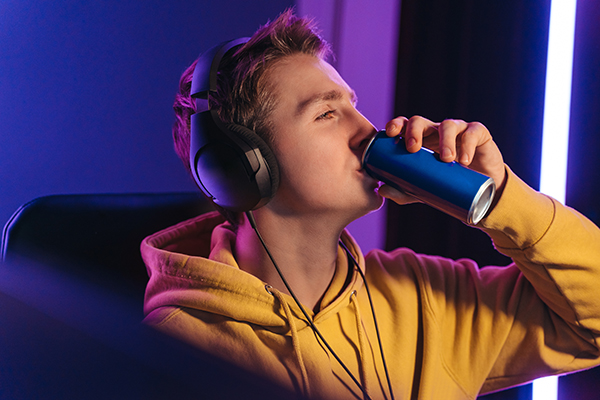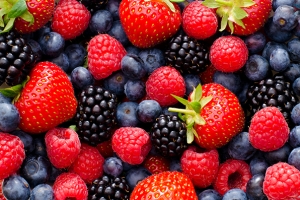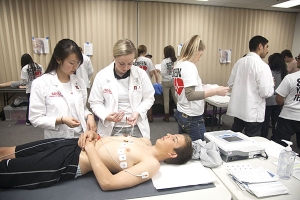
Perhaps you saw in the news recently that Panera has been charged with two deaths associated with a drink on their menu called Charged Lemonade. While there were likely special circumstances in those cases, it is, understandably, raising questions (again) about the safety of energy drinks. It’s important to understand that energy drinks contain a lot of caffeine and, depending on age, the American Academy of Pediatrics (AAP) either recommends no caffeine at all or a very limited amount. Read on for details.
WHAT’S ALL THE BUZZ ABOUT?
According to the National Center for Complementary and Integrative Health (NCCIH), energy drinks are obviously meant to increase energy, but also claim to enhance mental alertness and physical performance.
Marketing of the $85 billion (in 2021) global energy drink industry and widespread availability are partly to blame. Companies often report they don’t market to youth, but catchy slogans, attractive packaging and ads that feature top-performing athletes say otherwise. It’s no wonder that youth consume energy drinks with the hope of improved health, productivity and performance.
“Since the drinks are widely available, they seem perfectly acceptable,” says Nicole Cruz, a registered dietitian. “The advertising is hypocritical and dangerous.” Cruz also points out the pressure young people feel to achieve in academics and extracurricular activities in order to be accepted into college.
ARE ENERGY DRINKS SAFE?
The safety of energy drinks depends on age, personal health and the amount of caffeine consumed.
- The Food and Drug Administration says healthy adults can safely consume 400 mg of caffeine a day.
- The AAP strongly discourages any caffeine consumption for kids under the age of 12, citing concerns about the effects on developing neurologic and cardiovascular systems and the risk of physical dependence.
- The AAP says adolescents ages 12–18 should limit caffeine intake to less than 100 mg daily.
Cruz is concerned that there is easy access to an unregulated substance for such a susceptible group (young people who are coming into themselves and trying to achieve under pressure). “The decision-making part of their brains are still developing, and the effects are detrimental,” she says. She’s not alone in her concern. Other experts agree that energy drinks and youth are a bad combination. Some concerns include anxiety, hyperactivity, inattention, increased risk of weight gain, cavities, diabetes, poor sleep and heart health.
Energy drink effects last up to eight hours, negatively impacting sleep, learning and memory. “Those who regularly rely on these drinks for energy end up more tired and exhausted,” says Cruz. “When used as a pick-me-up, energy drinks can become part of a habitual cycle that can lead to irritability and anxiety.” As most people know, poor sleep also weakens the body’s immune system.
According to NCCIH, large amounts of caffeine may cause serious heart and blood vessel problems, such as heart rhythm disturbances and increases in heart rate and blood pressure.
HOW MUCH CAFFEINE DO ENERGY DRINKS CONTAIN?
Most energy shots and energy drinks contain 70 mg to 240 mg caffeine. “There’s no requirement to include the amount of caffeine on [energy drink] labels, so the actual caffeine content may not be clear,” says Cruz. She points out that some energy drinks also add guarana (a plant extract containing a high concentration of caffeine) and stimulants like ginseng and green tea to intensify effects and make them last longer. For reference, here is a caffeine comparison of some popular drinks:
12 oz can cola -- about 32 mg caffeine
8 oz cup coffee -- about 100 mg
2 oz bottle 5-Hour Energy shot (regular strength) – 200 mg; (extra strength) – 230 mg
12 oz can Red Bull -- 111 mg
Starbucks Latte (grande) – 150 mg
16 oz can Monster (two servings) – 163 mg
12 oz Celsius – 200 mg
Panera Charged Lemonade (20 oz) – 158 mg; (30 oz) – 390 mg
12 oz new Gatorade “Fast Twitch” – 200 mg
Regular Gatorade -- none
ARE THERE AGE LIMITS ON PURCHASING ENERGY DRINKS?
There are no federal age requirements to buy energy drinks in the U.S., but some areas have implemented their own local restrictions. For example, in Suffolk County (NY) selling energy drinks to individuals under 18 is prohibited. In addition, grassroots bills have sprung up in multiple states following high profile teen deaths associated with consumption of energy drinks.
NOTE: MIXING ENERGY DRINKS WITH ALCOHOL
The Centers for Disease Control reports that people ages 15–23 who mix energy drinks with alcohol are four times more likely to binge drink at high intensity (consume six or more drinks per episode) than those who do not mix energy drinks with alcohol. And contrary to popular belief, consuming energy drinks does not “sober you up” or reduce impairment from alcohol consumption.
WHAT PARENTS CAN DO
- Using reliable sources, become informed.
- If you have questions about the health of your kids, talk to your pediatrician.
- Encourage kids and other family members to hydrate with water.
- Most importantly, talk to your kids, teens, college students and young adults about the potential health risks of energy drinks. They may not know the recommended limitations.
Learn more at www.health.com/are-energy-drinks-healthy-7546381.
Cherie Gough is a freelance writer and mom of two living in San Diego’s East County.



















